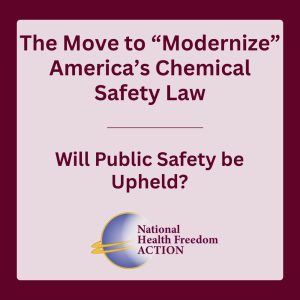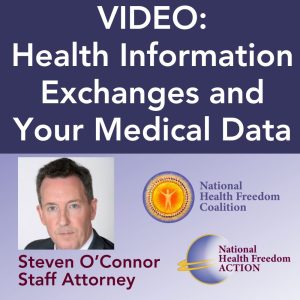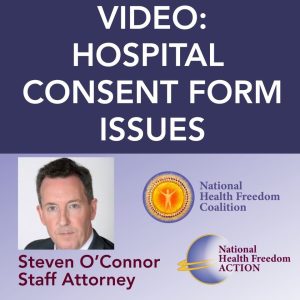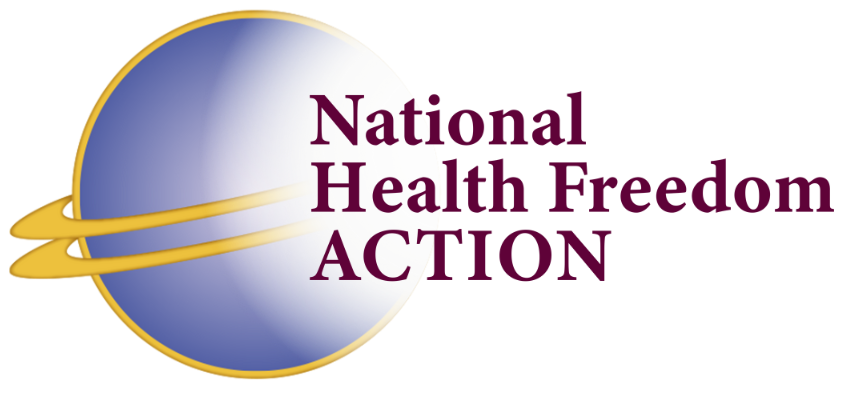

Can Government Infringe on your Health Freedom?
What is health freedom?
Health freedom is the freedom to make decisions about your health and survival. Health freedom is a fundamental natural right of survival and personal sovereignty.
 The U.S. protects health freedom: There are many United State laws that safeguard and protect citizen rights to be in charge of their own bodies and their own health. Even before the turn of the 20th century, Courts observed that “[n]o right is held more sacred, or is more carefully guarded, by the common law, than the right of every individual to the possession and control of his own person, free from all restraint or interference of others, unless by clear and unquestionable authority of law.” Union Pacific R. Co. v. Botsford, 141 U.S. 250, 251 (1891).
The U.S. protects health freedom: There are many United State laws that safeguard and protect citizen rights to be in charge of their own bodies and their own health. Even before the turn of the 20th century, Courts observed that “[n]o right is held more sacred, or is more carefully guarded, by the common law, than the right of every individual to the possession and control of his own person, free from all restraint or interference of others, unless by clear and unquestionable authority of law.” Union Pacific R. Co. v. Botsford, 141 U.S. 250, 251 (1891).
What do health freedom infringements look like?
An obvious infringement on health freedom would be when someone forces you to do something that impacts your health, or your health-related decision making, without your consent. For example:
Forcing you or your family member to get a medical treatment against your will.
Forcing you or your family member to stay in a hospital or facility against your will.
Forcing you to do things for health reasons that you do not consent to.
More common, but less easily recognized, are passive infringements on health freedom such as:
Having to live in an environment contaminated with dangerous chemicals and toxins.
Losing access to natural health care practitioners and healers of your choice because they have been outlawed.
Not having information and access to organic foods that are free from pesticides and GMO processes.
In peacetime, when there is no emergency, we look to our state and federal Constitutions and our existing state laws to determine whether an individual’s rights have been infringed.
State Constitutions affirm the civil and religious rights of the people. And State Constitutions also set forth the reason for and role of governments. For example, Minnesota’s government was instituted “for the security, benefit and protection of the people, in whom all political power is inherent…”,
State Laws are more specific and are passed by legislatures based on constitutional principles. They give governments the ability to enforce laws for particular topics. For example, a state public health law that requires quarantine of patients with Tuberculosis.
When there is a declared emergency, there is a set of special state laws that have been passed by state legislators, that provide guidance and give special powers to the State Governor and legislatures during national security emergencies and a peacetime emergency. When a Governor declares a national security or peacetime emergency these special laws are triggered and any orders and rules produced by the Governor during the emergency have the full force and effect of law.
But even if the Governor has special powers to make orders with the effect of law, the orders must be constitutional. Since health freedom rights are fundamental rights they are primarily protected by the constitution and any infringement of them presents a constitutional law question. When talking about state infringements on an individual’s fundamental rights during a declared emergency, the constitutional analysis would remain the same as it is in peacetime: the interests of the individual (to fully exercise his/her liberty right) must be balanced against the interest of the state (protect the public’s health by containing or eliminating the threat).
Emergency powers laws are extremely important and sometimes controversial because orders and rules produced by the Governor, a member of the executive – not the legislative – branch of government, during these emergencies have the full force and effect of law.
For example, before 2002, the Minnesota Governor could not declare an emergency unless it was a national security emergency or a peacetime emergency.
But in 2002, Minnesota passed a law that allowed the MN Governor to declare an emergency for a new reason: “public health emergencies”. Many people were concerned about this new law because “public health emergency” was defined very broadly. In response to those overbreadth concerns, three years later the legislature passed a law to delete the words “public health emergencies” from the list of national and peacetime emergencies. Now Minnesota again uses its original list to declare an emergency.
Can governments do ANYTHING that they think they need to in order to cope with the emergency?
In many states, the passage of “public health emergency” state laws gave the state the power to do “anything that is necessary” to cope with the emergency. And it is questionable whether those laws are constitutional. But states can pass laws that limit the breadth of that phrase; for example, in 2002, Minnesota passed a protective law that says, even in a state of emergency, we reserve the right to our bodily autonomy.
Here is Minnesota’s Notice of Refusal law:
Refusal of treatment. Notwithstanding laws, rules, or orders made or promulgated in response to a national security emergency or peacetime emergency, individuals have a fundamental right to refuse medical treatment, testing, physical or mental examination, vaccination, participation in experimental procedures and protocols, collection of specimens, and preventive treatment programs. An individual who has been directed by the commissioner of health to submit to medical procedures and protocols because the individual is infected with or reasonably believed by the commissioner of health to be infected with or exposed to a toxic agent that can be transferred to another individual or a communicable disease, and the agent or communicable disease is the basis for which the national security emergency or peacetime emergency was declared, and who refuses to submit to them may be ordered by the commissioner to be placed in isolation or quarantine according to parameters set forth in sections 144.419 and 144.4195.
Information given. Before performing examinations, testing, treatment, or vaccination of an individual under subdivision 1, a health care provider shall notify the individual of the right to refuse the examination, testing, treatment, or vaccination, and the consequences, including isolation or quarantine, upon refusal.
Individual Treatment; Notice, Refusal, Consequence., Minn. Stat. §12.39 (subdiv. 1-2) (2002).
2020 Constitutional Challenges to Governor Orders that impact Freedoms:
The declaration of national or peacetime emergencies now present an opportunity to test our nation as to how far a government can go to deal with an emergency. The 2020 crisis is presenting a unique opportunity for constitutional challenges and will contribute to the evolution of law as we evolve in our technical world.
For example, the Supreme Court of Wisconsin recently overturned its Governor’s stay-at-home order with judicial comments reflecting that expansive Governor orders cannot go beyond the constitutional inalienable rights of citizens, even in the case of declared emergencies. Read Wisconsin court opinion HERE.
And in Minnesota, the Upper Midwest Law Center announced its federal lawsuit on behalf of multiple Minnesota churches and small business owners and a request for a temporary restraining order to suspend enforcement of Governor Walz’s continuing shutdown of religious services.
Importance of Challenges to Freedom:
As our country and the world evolve, NHFC and NHFA will hold fast to the natural and legal concept that there are fundamental rights inherent to the human experience and the need for our laws to protect the integrity and sacredness of those rights. We will continue to work to protect the sacred right of all individuals to be in charge of their own health and well-being. We believe individuals and local communities can work together to find ways to thrive and survive without sacrificing those inalienable rights of life, liberty, and the pursuit of happiness and without running afoul of the constitutional protection of them – even in an emergency.
Go Here and Read More if you are interested in passing a law in your state that adds additional protections to personal sovereignty during declared emergencies.
RECENT NEWS



Video: Health Information Exchanges and Your Medical Data
February 5, 2026

Video: Hospital Consent Forms and Health Freedom
January 29, 2026
